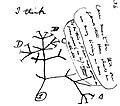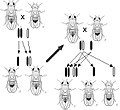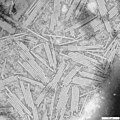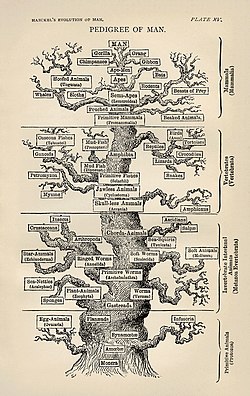Portal:Biology
Introduction


Biology is the scientific study of life and living organisms. It is a broad natural science that encompasses a wide range of fields and unifying principles that explain the structure, function, growth, origin, evolution, and distribution of life. Central to biology are five fundamental themes: the cell as the basic unit of life, genes and heredity as the basis of inheritance, evolution as the driver of biological diversity, energy transformation for sustaining life processes, and the maintenance of internal stability (homeostasis).
Biology examines life across multiple levels of organization, from molecules and cells to organisms, populations, and ecosystems. Subdisciplines include molecular biology, physiology, ecology, evolutionary biology, developmental biology, and systematics, among others. Each of these fields applies a range of methods to investigate biological phenomena, including observation, experimentation, and mathematical modeling. Modern biology is grounded in the theory of evolution by natural selection, first articulated by Charles Darwin, and in the molecular understanding of genes encoded in DNA. The discovery of the structure of DNA and advances in molecular genetics have transformed many areas of biology, leading to applications in medicine, agriculture, biotechnology, and environmental science.
Life on Earth is believed to have originated over 3.7 billion years ago. Today, it includes a vast diversity of organisms—from single-celled archaea and bacteria to complex multicellular plants, fungi, and animals. Biologists classify organisms based on shared characteristics and evolutionary relationships, using taxonomic and phylogenetic frameworks. These organisms interact with each other and with their environments in ecosystems, where they play roles in energy flow and nutrient cycling. As a constantly evolving field, biology incorporates new discoveries and technologies that enhance the understanding of life and its processes, while contributing to solutions for challenges such as disease, climate change, and biodiversity loss. (Full article...)
Selected article -

Ribosomes (/ˈraɪbəzoʊm, -soʊm/) are macromolecular biological machines found within all cells that perform messenger RNA translation. Ribosomes link amino acids together in the order specified by the codons of messenger RNA molecules to form polypeptide chains. Ribosomes consist of two major components: the small and large ribosomal subunits. Each subunit consists of one or more ribosomal RNA molecules and many ribosomal proteins (r-proteins). The ribosomes and associated molecules are also known as the translational apparatus. (Full article...)
Selected picture -

Major topics
Selected biography -
Richard Dawkins (born 26 March 1941) is a British evolutionary biologist, zoologist, science communicator and author. He is an emeritus fellow of New College, Oxford. In 1995 he was named the first Simonyi Professor for the Public Understanding of Science, a position he held until 2008, and is on the advisory board of the University of Austin. His book The Selfish Gene (1976) popularised the gene-centred view of evolution and coined the word meme. Dawkins has won several academic and writing awards. In 2005 he was awarded the Shakespeare Prize.
Dawkins is a critic of creationism and intelligent design. In The Blind Watchmaker (1986), he argues that the cumulative, non-random process of natural selection, coupled with random variation, can create complexity. In 1991 he gave the Royal Institution Christmas Lectures on Growing Up in the Universe. With Yan Wong, he co-authored The Ancestor's Tale (2004), a “Chaucerian pilgrimage to the dawn of life.” (Full article...)
General images -
Did you know -
- ... that endemics along the wildlife of Morocco include more than six hundred species of vascular plants and a single species of bird?
- ... that an extract of Alchemilla diademata, a plant endemic to Lebanon, shows antimicrobial activity against Staphylococcus aureus?
- ... that more than 5,000 hen fleas were recorded from the nest of a coal tit?
Things you can do
Related portals
Biology portals
Categories

Anatomy - Anthropology - Astrobiology - Biochemistry - Bioengineering - Bioinformatics - Biotechnology - Botany - Cell biology - Conservation biology - Developmental biology - Ecology - Environmental science - Evolutionary biology - Genetics - Mathematical biology - Medicine - Microbiology - Immunology - Molecular biology - Mycology - Neuroscience - Paleontology - Palynology Parasitology - Pharmacology -
Phylogenetics - Physiology - Systems biology - Taxonomy - Toxicology - Virology - ZoologyMore topics
WikiProjects

WikiProjects connected with biology:
A complete list of scientific WikiProjects can be found here. See also Wikispecies, a Wikimedia project dedicated to classification of biological species.
Associated Wikimedia
The following Wikimedia Foundation sister projects provide more on this subject:
-
Commons
Free media repository -
Wikibooks
Free textbooks and manuals -
Wikidata
Free knowledge base -
Wikinews
Free-content news -
Wikiquote
Collection of quotations -
Wikisource
Free-content library -
Wikiversity
Free learning tools -
Wiktionary
Dictionary and thesaurus
















































